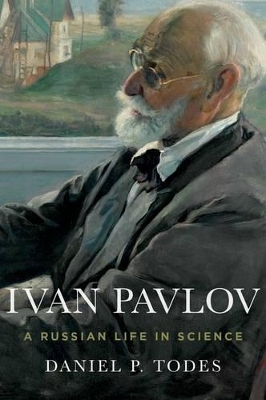
Ivan Pavlov
Oxford University Press Inc (Verlag)
978-0-19-992519-3 (ISBN)
This is a definitive, deeply researched biography of Russian physiologist Ivan Pavlov (1849-1936) and is the first scholarly biography to be published in any language. The book is Todes's magnum opus, which he has been working on for some twenty years. Todes makes use of a wealth of archival material to portray Pavlov's personality, life, times, and scientific work.
Combining personal documents with a close reading of scientific texts, Todes fundamentally reinterprets Pavlov's famous research on conditional reflexes. Contrary to legend, Pavlov was not a behaviorist (a misimpression captured in the false iconic image of his "training a dog to salivate to the sound of a bell"); rather, he sought to explain not simply external behaviors, but the emotional and intellectual life of animals and humans. This iconic "objectivist" was actually a profoundly anthropomorphic thinker whose science was suffused with his own experiences, values, and subjective interpretations.
This book is also a traditional "life and times" biography that weaves Pavlov into some 100 years of Russian history-particularly that of its intelligentsia--from the emancipation of the serfs to Stalin's time. Pavlov was born to a family of priests in provincial Ryazan before the serfs were emancipated, made his home and professional success in the glittering capital of St. Petersburg in late imperial Russia, suffered the cataclysmic destruction of his world during the Bolshevik seizure of power and civil war of 1917-1921, rebuilt his life in his 70s as a "prosperous dissident" during the Leninist 1920s, and flourished professionally as never before in 1929-1936 during the industrialization, revolution, and terror of Stalin.
Todes's story of this powerful personality and extraordinary man is based upon interviews with surviving coworkers and family members (along with never-before-analyzed taped interviews from the 1960s and 1970s), examination of hundreds of scientific works by Pavlov and his coworkers, and close analysis of materials from some twenty-five archives. The documents range from the records of his student years at Ryazan Seminary to the transcripts of the Communist Party cells in his labs, and from his scientific manuscripts and notebooks to his political speeches; they include revealing love letters to his future wife and correspondence with hundreds of lay people, scholars, artists, and Communist Party leaders; and unpublished memoirs by many coworkers, his daughter, his wife, and his lover.
Daniel P. Todes is Professor, Institute of History of Medicine, Johns Hopkins University
Preface ; Introduction ; PART ONE: The Seminarian Chooses Science (1849-1874) ; 1. The Pavlovs of Riazan' ; 2. Seminarian in the 'Sixties ; 3. St. Petersburg University ; PART TWO: Wilderness Years (1875-1890) ; 4. The Reluctant Physician ; 5. Serafima Vasil'evna Karchevskaia ; 6. Time of Troubles ; 7. In From the Cold ; PART THREE: Man of Tsarist Science (1891-1904) ; 8. A NonChekhovian Type ; 9. The Pavlovs of St. Petersburg ; 10. Professor of Physiology ; 11. The Physiology Factory: Forces of Production ; 12. The Physiology Factory: Relations of Production ; 13. Favorite Dogs ; 14. A Convincing Synthesis ; 15. Dacha Life ; 16. A European Reputation ; 17. Targeting the Psyche ; 18. The Nobel Prize ; PART FOUR: Nobelist in the Silver Age (1905-1914) ; 19. Amid Russia's Political Crisis ; 20. Family Life ; 21. Pavlov's Quest ; 22. The Factory Retooled ; 23. Battle of the Titans ; 24. Women Coworkers and the Physiology of Emotion ; 25. Mariia Kapitonovna Petrova ; PART FIVE: War and Revolution (1914-1921) ; 26. War ; 27. Revolution ; 28. Cataclysm ; 29. Where Are You, Freedom? ; 30. To Leave My Homeland ; PART SIX: Prosperous Dissident (1922-1929) ; 31. The Pavlovs of Leningrad ; 32. A Great Journey ; 33. Laboratory Revival ; 34. Lecturing the Bolsheviks and Leaving the Academy ; 35. The Commissar and the Dialectician ; 36. Freud, the Flood, and the Physiology of Personality ; 37. Two Books and a Beast ; 38. Types, Temperament, and Character ; 39. Work and Play in City and Countryside ; 40. On the Eve of the Great Break ; PART SEVEN: Icon of Soviet and World Science (1929-1936) ; 41. International Celebrity ; 42. Stalin Times ; 43. Pavlov's Communists ; 44. Koltushi: Pavlov's Science Village ; 45. Psychiatry ; 46. Gestalt Pavlov-Style ; 47. Year of Climaxes ; 48. At the Summit: The International Physiology Congress ; 49. Final Days ; Epilogue ; Glossary ; Bibliography
| Erscheint lt. Verlag | 18.12.2014 |
|---|---|
| Zusatzinfo | 47 illus. |
| Verlagsort | New York |
| Sprache | englisch |
| Maße | 167 x 242 mm |
| Gewicht | 1420 g |
| Themenwelt | Literatur ► Biografien / Erfahrungsberichte |
| Sachbuch/Ratgeber ► Natur / Technik | |
| Geisteswissenschaften ► Geschichte ► Regional- / Ländergeschichte | |
| Geschichte ► Teilgebiete der Geschichte ► Technikgeschichte | |
| Geisteswissenschaften ► Psychologie ► Biopsychologie / Neurowissenschaften | |
| Studium ► Querschnittsbereiche ► Geschichte / Ethik der Medizin | |
| ISBN-10 | 0-19-992519-4 / 0199925194 |
| ISBN-13 | 978-0-19-992519-3 / 9780199925193 |
| Zustand | Neuware |
| Haben Sie eine Frage zum Produkt? |
aus dem Bereich


